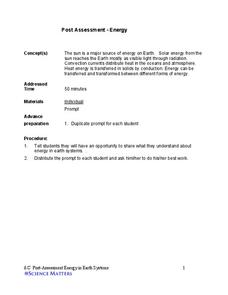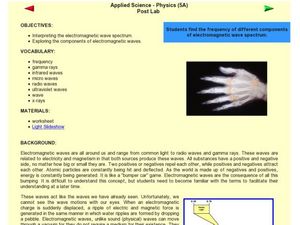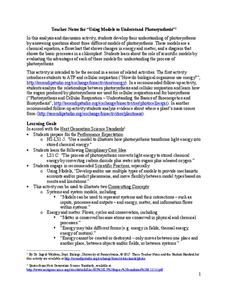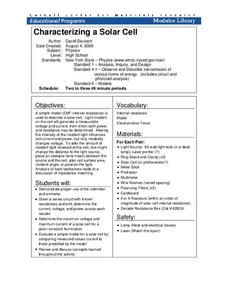Curated OER
Transformation of Energy-8th Grade
Eighth graders examine how electricity is produced in relation to the atom as well as what causes electric current to flow and what determines how much current flows through a circuit. These and other concepts of transformation of energy...
Curated OER
Circuit City
Fifth graders are introduced to the concept of circuits and how electricity works. In groups, they design their own subdivision with houses in which they have inside and outside light sources. To end the lesson, they make the circuits...
Curated OER
Reading Food Labels
Students investigate the concept of phonemic awareness in order to help increase reading comprehension. The reading of food labels creates the context for the practice session. They pay particular attention to certain sounds that must be...
Science Matters
Post-Assessment Energy
After nine lessons and activities about energy, here is the final assessment. The 20-questions include multiple choice, multiple choice with justification, short answer, answer analysis, and labeling diagrams to challenge learners.
Curated OER
Automated Vehicle Programming Design
Students design a program to make an automated vehicle perform a specific task. In this robotics lesson, students play the role of scientists competing to win a factory's contract. They present their algorithm to class.
Curated OER
Global Water Cycle & Heat Flow
Students experiment to discover how different variables affect the water cycle. They do hat flow experiments and construct a computer heat flow model.
Curated OER
Focusing Event to Electricity
Students explain how electrical charges behave. In this electricity lesson, students determine how far away lightning is when it strikes. They research how fabric softener reduces static electricity and share their findings in class.
Curated OER
Electricity
Twenty-one slides cover all aspects of electricity; from electric charge, to protons, lightning, currents, the calculations for wire resistance, circuits, household devices, and fluorescence. The amount of detail and the range of topics...
Curated OER
The Wonderful World of Waves (Wave Basics)
High schoolers define amplitude, wavelength, frequency, and period, calculate period given frequency, and calculate frequency given period, define crest and trough and locate both on diagram of wave, differentiate between latitudinal and...
Curated OER
Electromagnetic Spectrum
Students define electromagnetic radiation, list major categories and uses of electromagnetic waves, identify potential health risks with electromagnetic waves, and demonstrate understanding of Plank's constant by solving quantitative...
Curated OER
F = a, Inertia, and Friction
Fourth graders use a matchbox car to push across a hard surface and observe what happens. They then push the car across a soft or rough surface and discover what happens. The two ideas are discusses as Newton's First and Second Laws of...
Curated OER
Life Inspires Art Inspires Life
Students create philanthropic documentaries. In this philanthropy lesson, students collaborate to create a multimedia documentary regarding the community philanthropy work they took part in.
Curated OER
Electromagnetic Wave Spectrum
Fifth graders examine electromagnetic wave spectrum. In this science instructional activity, 5th graders discuss the aspects of the electromagnetic wave spectrum and complete a worksheet identifying the parts of the spectrum.
Curated OER
Design a Bobsled
Students apply their knowledge of friction, drag, mass and gravity as they design, build, and test mini-bobsleds.
Curated OER
Circle of Pong
Students, in groups, use given materials to devise a way to deposit a ping-pong ball into a paper cup that is located in the middle of a 6-foot diameter circle, while standing outside the circle.
Discovery Education
Sonar & Echolocation
A well-designed, comprehensive, and attractive slide show supports direct instruction on how sonar and echolocation work. Contained within the slides are links to interactive websites and instructions for using apps on a mobile device to...
Curated OER
X-ray Spectroscopy and the Chemistry of Supernova Remnants
This link takes you to a comprehensive unit that delves into emission spectra and supernovas. There are four parts: How and where elements are created, electromagnetic radiation, spectroscopy, and the newest technology for studying our...
Curated OER
Producing a Strain of E. coli that Glows in the Dark
Students observe the experimental process called bacterial transformation and demonstrate phenotype changes in bacteria that have been transformed with an antibiotic-resistance gene and a metabolic marker. They create a luminescent...
Serendip
Using Models to Understand Photosynthesis
Is your class in the dark about photosynthesis? Shed some sunlight on an important biological process with a thoughtful activity. After answering questions to help determine their level of knowledge, learners work with chemical equations...
Virginia Department of Education
Properties of Compounds and Chemical Formulas
Young chemists have unknown compounds they need to sort. Performing three different tests on each, the chemical behaviors they observe become the basis for data analysis.
Virginia Department of Education
Metals, Nonmetals, and Metalloids
How can one easily classify metals, nonmetals, and metalloids? Pupils answer this question as they experiment with unknown substances and perform tests on conductivity, brittleness, and malleability to determine which unknown belongs in...
Colorado State University
Can Energy Be Created or Destroyed?
Energy doesn't come out of nowhere! An engaging lesson has learners investigate energy as it transforms from one type to another. They collect data to prove that energy is not lost as it changes.
University of Colorado
Using Spectral Data to Explore Saturn and Titan
Saturn's rings are made of dust, ice, and solid chunks of material. Individuals use spectrographs in this final installment of 22 lessons to determine the atmospheric elements. They analyze spectrums from Titan's atmosphere and Saturn's...
Cornell University
Characterizing a Solar Cell
Young classes are sure to get a charge out of this instructional activity! Learners experiment with circuits of a solar cell. They practice determining current, voltage, and power for the circuit and maximize the voltage and current of...

























